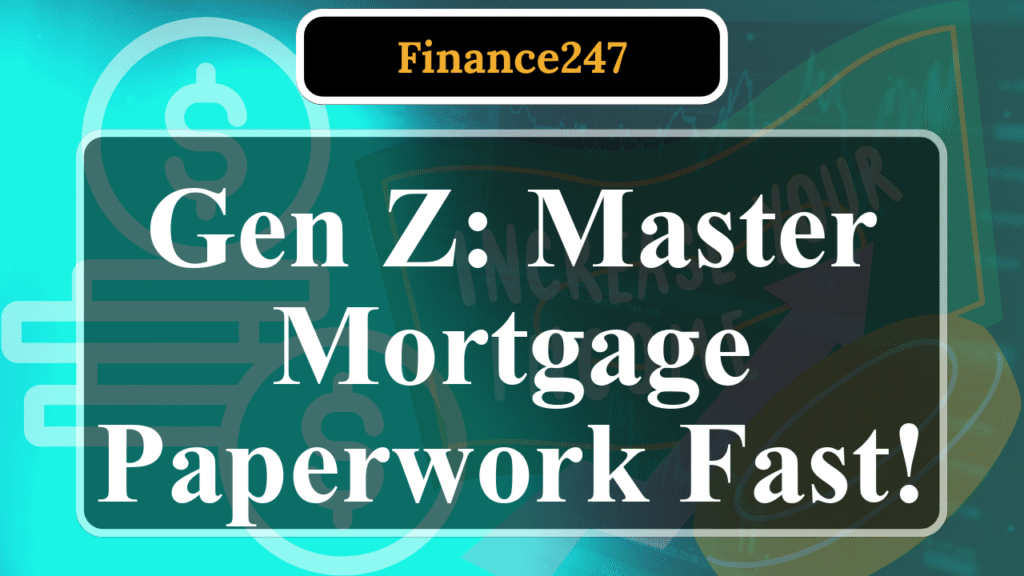“This article guides Gen Z buyers through the complex mortgage paperwork process, highlighting key documents like the Loan Estimate and Closing Disclosure, common challenges, and strategies to simplify the journey. It emphasizes preparation, digital tools, and seeking professional guidance to ensure confidence and avoid costly mistakes in the homebuying process.”
Mastering Mortgage Paperwork for Gen Z Homebuyers
Navigating mortgage paperwork can feel overwhelming for Gen Z buyers, who often face their first major financial transaction with limited experience. With home prices at a median of $405,000 and 30-year fixed mortgage rates averaging 6.79% in 2025, understanding the process is critical to securing affordable financing. Here’s a detailed guide to help Gen Z buyers in the U.S. confidently manage mortgage documentation.
Understand Key Mortgage Documents
The mortgage process involves several essential documents, each serving a specific purpose. The Loan Estimate, provided within three days of applying for a mortgage, outlines estimated loan terms, interest rates, closing costs, and monthly payments. It’s a tool to compare offers from lenders, with 45% of first-time buyers securing better rates by shopping multiple lenders. The Closing Disclosure, issued at least three days before closing, finalizes these details and must be reviewed carefully for accuracy. Errors in these documents can lead to unexpected costs, so Gen Z buyers should scrutinize interest rates, fees, and loan terms. The mortgage application form requires accurate financial details like income, debts, and assets. Providing incorrect information can delay approval or lead to legal issues. Other documents include the Good Faith Estimate (GFE) for cost comparisons and the HUD-1 Settlement Statement, which details all transaction costs at closing.
Overcome Common Challenges
Gen Z buyers, typically aged 18–28, face unique hurdles. Many lack confidence in navigating the mortgage process, with 65% expressing uncertainty about qualifications. Limited credit history can complicate approvals, though it may qualify some for first-time buyer programs like FHA loans with 3% down payments. High debt-to-income ratios, often from student loans, also pose challenges, with 40% of non-homeowners citing inability to save for down payments. To address these, Gen Z should check credit reports from Experian, Equifax, and TransUnion for errors and dispute inaccuracies to boost scores. A score of 620 or higher is typically required for conventional loans, but higher scores secure better rates.
Leverage Digital Tools
As a tech-savvy generation, Gen Z can use digital platforms to streamline paperwork. Mobile apps from lenders like Rocket Mortgage allow document uploads, real-time loan tracking, and rate comparisons. These tools reduce administrative burdens, with some lenders like United Wholesale Mortgage closing loans in as little as 16 days due to digital efficiencies. Online mortgage calculators help estimate payments based on income, debt, and down payment, ensuring budgets align with affordability. Gen Z should prioritize lenders with mobile-optimized interfaces, as 60% of this demographic avoids slow or clunky websites.
Seek Professional Guidance
Mortgage brokers and financial advisors are invaluable for Gen Z buyers. Brokers can educate on loan options, such as fixed-rate mortgages for stability or adjustable-rate mortgages (ARMs) for lower initial payments. They also guide buyers to programs like HomeReady, offering 3% down payments, or Non-QM loans for those with unconventional income, like gig workers. A trusted advisor can simplify complex terms and prevent buyer’s remorse, which affects 69% of Gen Z homeowners. Virtual workshops or webinars on credit building and down payment savings are also effective, with many brokers offering free sessions tailored to young buyers.
Prepare Financially and Stay Organized
Preparation is key. Gen Z buyers should save for a down payment, ideally 14.4% of the home price based on 2024 data, though 3% may suffice for FHA loans. Budget for closing costs, averaging $7,500, and moving expenses up to $2,500. Organizing documents like bank statements, tax returns, and proof of employment in advance speeds up approvals. Using secure digital folders or apps ensures sensitive information, like Social Security numbers, is protected, as data security is a priority for 65% of Gen Z.
Avoid Common Pitfalls
Mistakes like overlooking fine print or rushing through paperwork can lead to financial strain. Gen Z buyers should avoid pre-approving for the maximum loan amount without considering long-term affordability, as this contributes to high regret rates. Reading all documents thoroughly and asking lenders questions—such as whether rates can be locked or if closing costs can be negotiated—builds confidence. Partnering with real estate agents or lenders who prioritize transparency, valued by 93% of Gen Z, ensures a smoother process.
Explore Affordable Markets and Programs
Gen Z buyers often target affordable areas like Salt Lake City or Indianapolis, where home prices are below the national median. Researching local markets via platforms like Zillow or Realtor.com helps identify budget-friendly options. First-time buyer programs, such as Citi’s Lender Paid Assistance covering up to $7,500 in closing costs, can ease financial burdens. Awareness of these programs is low, so consulting a lender early is crucial to maximize benefits.
Disclaimer: This article provides general guidance based on current market trends, reports, and expert insights from sources like Zillow, Realtor.com, and Fannie Mae. Always consult a licensed mortgage professional or financial advisor for personalized advice tailored to your financial situation.


